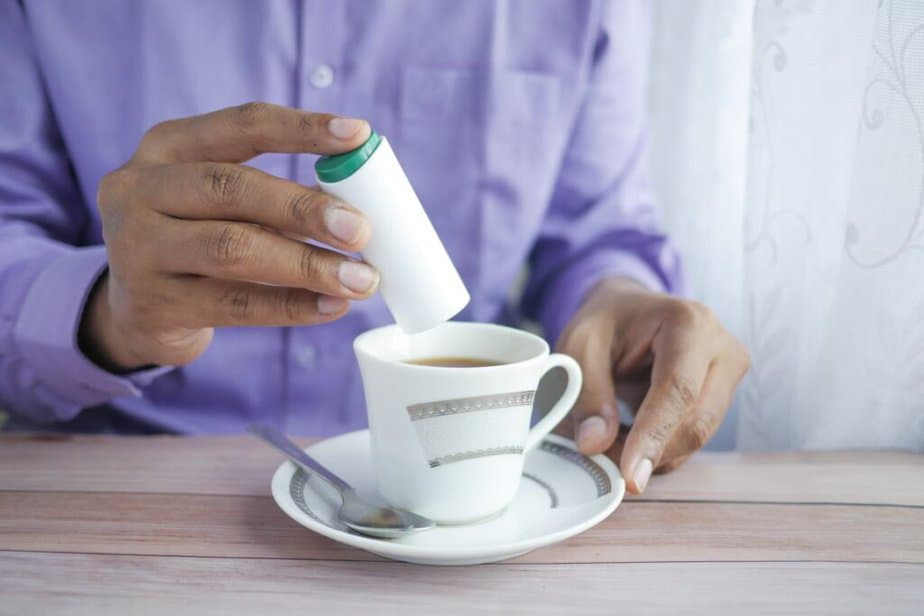Artificial sweeteners are everywhere in low-calorie food and drink and aspartame is a common variety in the United States. If you’ve ever used the tiny packets of Equal®, Nutrasweet®, or Sugar Twin®, you’re adding aspartame. Even though people often use it as a food additive, its most common use is in diet sodas including Diet Pepsi®, Diet Coke®, and many more. It is much sweeter than sugar so the idea is that consumers will use less of it.

Much research is undertaken to ascertain its safety and by and large experts generally consider it to be safe. However, more and more investigation is pointing towards its link with health problems. This new research is making connections not previously known and these results may be important for future consumption recommendations.
The link between aspartame and anxiety in mice
Authors in this 2022 article published in PNAS found that low (~15% of the recommended daily dose) aspartame consumption raised anxiety-like behavior in mice. This effect appeared in a dose dependent manner. Additionally, it caused epigenetic changes in the amygdala, the region of the brain associated with fear. Effects regarding the latter appeared to be hereditary for up to two generations.
In this study, authors gave male and female mice drinking water containing a dose equivalent to 8 to 15% of the FDA recommended maximum human daily intake (50 milligrams for each kilogram of body weight). Then, they observed the mice for anxiety-like behavior. The researchers also investigated molecular changes in the brain by giving the mice showing anxiety diazepam, a drug known to modulate the GABA-A receptor (anxiety regulator) and performing additional gene expression studies on the amygdala. Finally, they tested future generations for these important anxiety markers.
They assessed anxiety in mice using an open field test in which they scored mice that spent less time in the center and more time near the side as having higher anxiety. Overall, the researchers found that the more aspartame the mice consumed, the less likely they were to remain in the center of the field. Thus, they considered these mice more anxious.
Molecular changes
To show that the behavior was anxiety-driven the researchers examined the effect of diazepam on time the mice spent in the center areas. Experts know a downregulation of GABA-A receptor signaling causes anxiety. Diazepam works directly on this pathway and relieves anxiety in both humans and rodents. Doctors routinely prescribe it for generalized anxiety disorder. Although small, the amount of mice who spent more time in the center increased when they took diazepam, suggesting that the drug alleviated anxiety.
This result prompted further investigation into the gene expression in certain areas of the brain. RNA sequencing and quantitative PCR revealed a significant change in the studied pathway in the amygdala. Taken together, the researchers believe aspartame causes a shift in the inhibition-excitation portion of the brain towards excitation, prompting anxiety.

Is the anxiety hereditary?
Through breeding, the authors found that the phenotypes first observed with exposed individuals were heritable through the paternal line for up to two generations. The initial group as well as the first and second generations showed anxiety behavior and response to diazepam. However, only the initial group and their first generation showed the gene expression changes.
The authors note that their results appear more robust than previous studies on this topic which they contribute mainly towards study design. Notebally, most of the previous reports administered the aspartame for 30 days or less. The authors believe that the mice need to ingest aspartme consistently for 6-8 weeks to cause observable anxiety effects.
Although they only studied this behavior in mice, it could lay the groundwork for studying the link between aspartame and anxiety in humans. This is especially true because the dose in this study is only a fraction (15%) of the daily recommended dose. If translatable to humans, it suggests that mental health may be affected with aspartame doses lower than the current FDA guidelines and that issues may persist through multiple generations, even if the younger generations do not directly consume it.
Citation: Jones SK, McCarthy DM, Vied C, Stanwood GD, Schatschneider C, Bhide PG. Transgenerational transmission of aspartame-induced anxiety and changes in glutamate-GABA signaling and gene expression in the amygdala. Proc Natl Acad Sci U S A. 2022 Dec 6;119(49):e2213120119. doi: 10.1073/pnas.2213120119. Epub 2022 Dec 2. PMID: 36459641.
January 13, 2022
